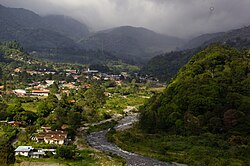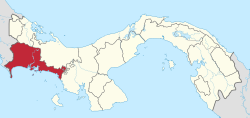Chiriquí (Spanish pronunciation: [tʃiɾiˈki]) is a province of Panama located on the western coast; it is the second most developed province in the country, after the Panamá Province. Its capital is the city of David. It has a total area of 6,490.9 km2, with a population of 471,071 as of the year 2023.[4][1] The province of Chiriquí is bordered to the north by the province of Bocas del Toro, to the west by Costa Rica, to the east by the province of Veraguas, and to the south by the Pacific Ocean, specifically the Gulf of Chiriquí.
Chiriquí Province
Provincia de Chiriquí | |
|---|---|
 | |
 | |
| Coordinates (Seat of Government): 8°26′N 82°26′W / 8.433°N 82.433°W | |
| Country | Panama |
| Founded | May 26, 1849 |
| Capital | David |
| Area | |
• Total | 6,490.9 km2 (2,506.2 sq mi) |
| Highest elevation | 3,477 m (11,407 ft) |
| Lowest elevation | 0 m (0 ft) |
| Population (2023 census)[1] | |
• Total | 471,071 |
| • Density | 73/km2 (190/sq mi) |
| GDP (PPP, constant 2015 values) | |
| • Year | 2023 |
| • Total | $11.9 billion[2] |
| • Per capita | $26,800 |
| Time zone | UTC-5 (EDT) |
| ISO 3166 code | PA-4 |
| Gini (2007) | 32.9 (low) |
| HDI (2021) | 0.805[3] very high |
History
editUntil the arrival of the Spanish conquistadores, Chiriquí was populated by a number of indigenous tribes, known collectively as the Guaymí people.
The first European to visit and describe Chiriquí was Gaspar de Espinosa, in 1519. The province was officially established on 26 May 1849, when Panama was still part of Colombia. Several years later, President Abraham Lincoln of the United States proposed Chiriquí as a favored location for Linconia, a colony for free blacks from the United States. Only 349 accepted the offer. Most blacks were not interested.
Chiriquí was the province in which Manuel Noriega rose in the military ranks in the late 20th century; he helped bring Omar Torrijos back into the country after a coup d'état. Noriega had jeeps lined up with their lights on the runway in David to allow Torrijos's aircraft to land. Chiriqui was at the heart of a short-lived pro-democracy guerrilla movement in the late 1960s and early 1970s. After the dictatorship by Manuel Noriega from 1983 to 1989, Guillermo Endara became president of Panama; he appointed Edgar De Puy as governor of Chiriquí.
Administrative divisions
editChiriquí Province is divided into 13 distritos (districts) and sub-divided into 100 corregimientos,[5] although a 14th district and an additional corregimiento took effect from May 2019.
| Distrito | Area (km2) |
Population Estimate |
Population Estimate |
|---|---|---|---|
| Alanje | 443 | 16,996 | 17,433 |
| Barú | 595 | 57,424 | 58,472 |
| Boquerón | 295 | 15,475 | 16,229 |
| Boquete | 488 | 22,002 | 23,313 |
| Bugaba | 880 | 80,527 | 83,704 |
| David | 868 | 155,812 | 172,384 |
| Dolega | 251 | 25,848 | 26,805 |
| Gualaca | 626 | 10,037 | 10,412 |
| Remedios | 167 | 4,170 | 4,323 |
| Renacimiento | 529 | 21,126 | 21,490 |
| San Félix | 218 | 6,493 | 6,803 |
| San Lorenzo | 648 | 7,729 | 8,024 |
| Tierras Altas | [7] | [7] | [7] |
| Tolé | 482 | 12,238 | 12,674 |
Note: Through Law 55 of 13 September 2013, the creation of Tierras Altas District had been approved, consisting of the corregimientos of Cerro Punta, Cuesta de Piedra, Nueva California, Paso Ancho and Volcán, which were split off from Bugaba District. The new district was to have Volcán as its main centre. Also through that same law, the corregimiento of Solano was created, after splitting off from the corregimiento of La Concepción, Bugaba. That new administrative division within Chiriquí Province was to come into effect by 2 May 2019.[8][9]
Climate
editThe province features a variety of climates, from hot and humid lowlands to the cool and moist highlands. The district is home to Fortuna Forest Reserve.
References
edit- ^ a b c Instituto Nacional de Estadística y Censo, Ciudad de Panamá.
- ^ "TelluBase—Panama Fact Sheet (Tellusant Public Service Series)" (PDF). Tellusant. Retrieved 2024-01-11.
- ^ "Sub-national HDI - Area Database - Global Data Lab". hdi.globaldatalab.org. Retrieved 2024-03-16.
- ^ "Panama: Provinces & Major Urban Places - Population Statistics, Maps, Charts, Weather and Web Information". www.citypopulation.de. Retrieved 2024-03-10.
- ^ "Municipios (distritos) de Chiriquí". Editorial OX. Retrieved 15 November 2012.
- ^ As of 1 July 2010; adjusted for under-enumeration in the 2010 Census. Source: Instituto Nacional de Estadística y Censo, Ciudad de Panamá.
- ^ a b c included in figure for Bugaba District.
- ^ «Presidente sanciona Ley que crea distrito de Tierras Altas en Chiriquí», Article from 16 September 2013 on the Ministry of Presidency of Panama website.
- ^ "Ley 55" (PDF). Gaceta Oficial Digital. Año CIX (27374): 2–11. 16 September 2013.
External links
edit- Knowing more about Chiriqui in My Panama Live
- K. Holmberg 2010 'Placing Immateriality: Situating the Material of Highland Chiriquí', Internet Archaeology 28. doi:10.11141/ia.28.5
- The Art of Precolumbian Gold: The Jan Mitchell Collection, an exhibition catalog from The Metropolitan Museum of Art (fully available online as PDF), which contains material on Chiriqui
- Temoltzin-Loranca, Yunuén; Velez, María Isabel; Moreno, Enrique; Escobar, Jaime (2018). "Late Holocene environmental change in Lake Boquete and its watershed: human or natural causes?" (PDF). Boletín de la Sociedad Geológica Mexicana. 70 (1): 121–131. doi:10.18268/BSGM2018v70n1a7.

